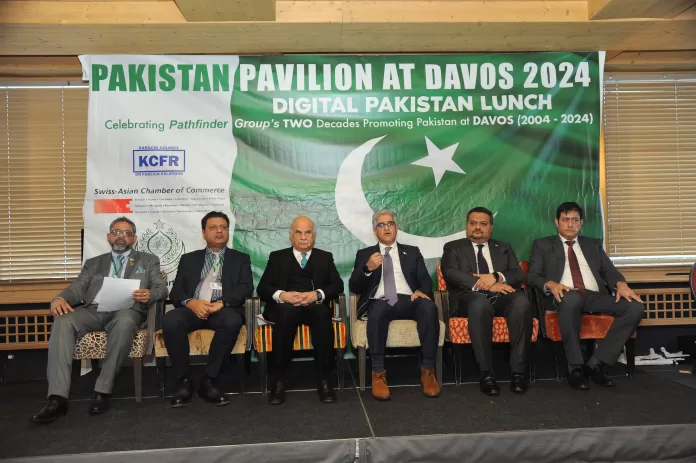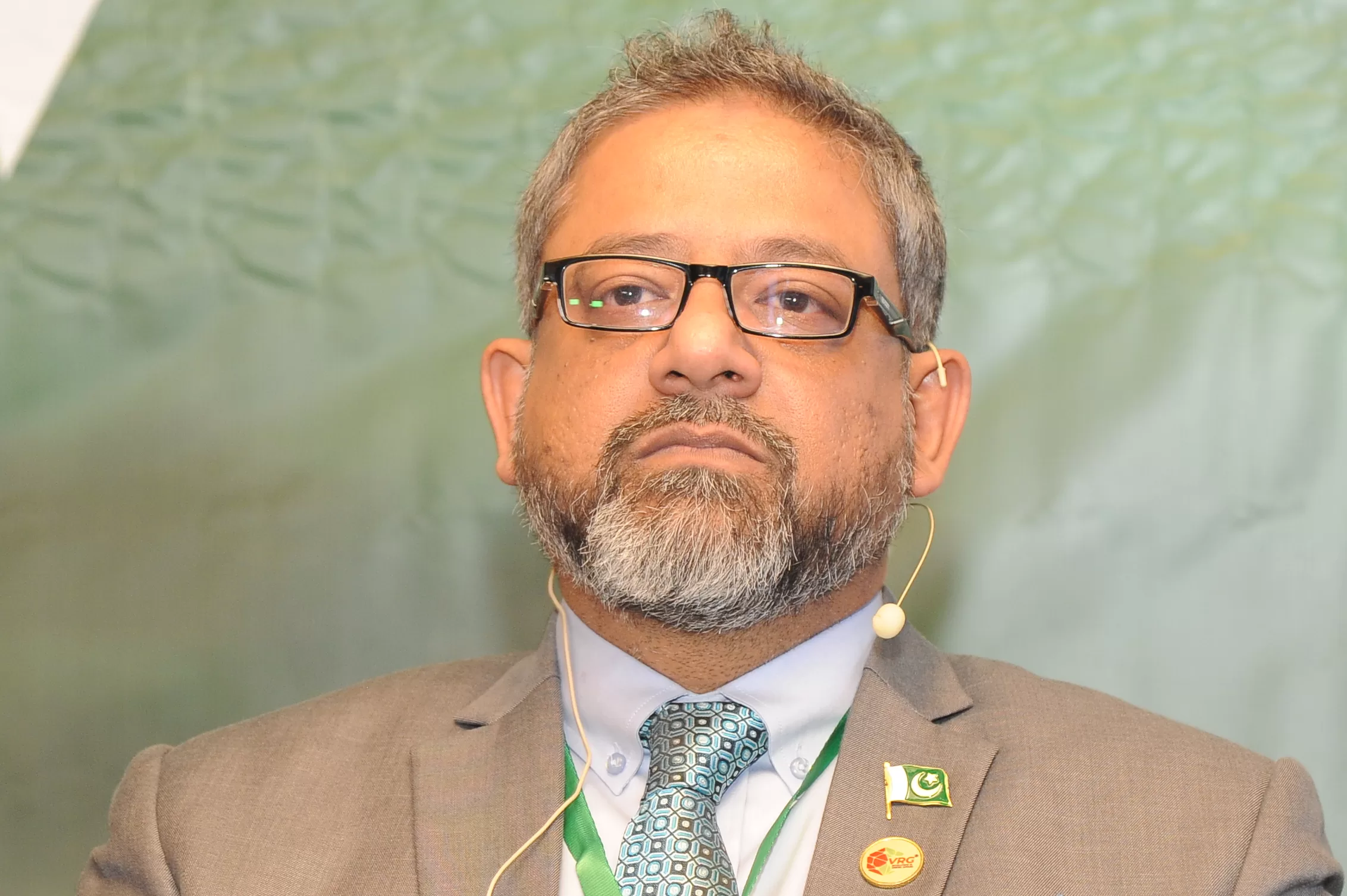
Salman Ali, Moderator/CEO VRG
Welcome to the Pakistan Pavilion and the lunch event with the topic of Digital Pakistan. Before I start and give the introduction of all the speakers, let me first call upon Mr Urs Lustenberger President SACC to welcome the speakers and the audience.

Dr Urs Lustenberger, President SACC
Thank you, Excellencies, ladies and gentlemen, friends of the chamber, and friends of Pakistan. It’s my pleasure and honour to welcome you all to today’s event about Pakistan. I have been one of the avid followers of Ikram Sehgal, who is behind the Pathfinder Group, and who has shown us and told us about his efforts and ventures into the digital world. I was amazed when I saw, during one of the last times, how they were trying to hook up new clients to their digital banking system. I have been amazed to see today that now it’s almost impossible to keep track of the number; then they were still counting in the hundreds, and now they’re counting in millions. So, the thing is important. I had the pleasure this afternoon to meet a lady from Africa who is highly interested in what you do in Egypt and Morocco, and I will make sure that you hook up with her so that you can expand into their market as well. Because their market is now being used for people who have smartphones only, and the traction is very small because most people still have these smaller phones. So, I think you will be the right guys to show them the way. Without further ado, I would like to thank all of you for your interest, and I would like to offer to Ikram because, for the first time I’ve heard this morning that he’s open for investment, I would like to offer to Ikram that we as a Chamber will be more than willing to help him find investors in this part of the world.
Salman Ali, Moderator
We have a group of speakers with us, very high-profile individuals, and dignitaries who are contributing to making digital Pakistan a reality. Our Chief Guest today is the Honorable Dr Muhammad Jehanzeb Khan, who is the Special Assistant to the Prime Minister on Government Effectiveness. Today, our keynote speaker is Mr Zohaib Khan, the chairman of PASHA, a renowned figure who is leading the tech destination of Pakistan as a global brand throughout the world. We also have Mr Shakeel Ahmed, the GM of Information Technology for the Utility Stores Corporation. I believe this is one of the few organizations in Pakistan that is fully digital end-to-end, which is quite remarkable. On another note, we have Mr Amir Ibrahim, the President of Jazz and the Chairman of Mobilink Micro Finance Bank. Additionally, we have Dr. Tariq Malik, a consultant of the World Bank and former chairman of NADRA. Lastly, we have Mr Ali Shah Asani, the CEO of iPath, who is the technical brain behind VRG and all the concepts we are currently implementing. We are proud of what Ali and his team have achieved. To begin, I would like to ask the Honorable Dr Muhammad Jehanzeb Khan to please start the proceedings.
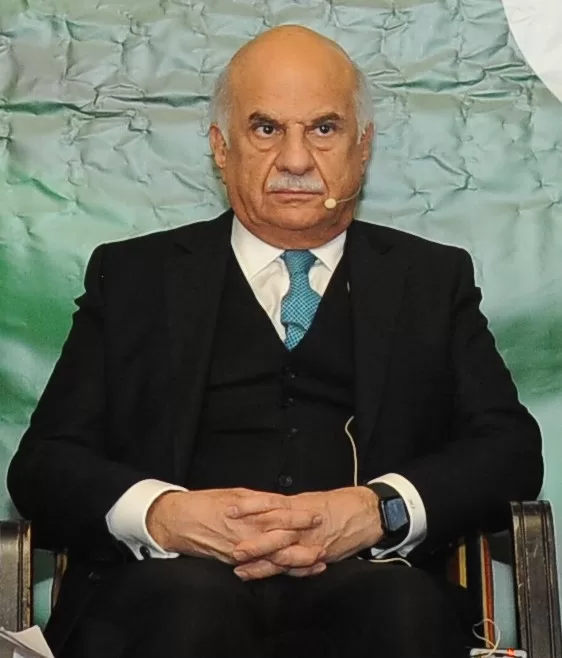
Jehanzeb Khan, Special Assistant to PM
I would begin by thanking Ikram Sehgal and Pathfinder Group for inviting me and giving me this opportunity to address you. I’m very pleased to see the CEO of Jazz, the Chairman of Pasha, and the general manager from USC, Mr Tariq Malik from the World Bank among this distinguished audience.
I heard about the Special Investment Facilitation Council (SIFC) yesterday, so I won’t dwell on it, but for those of you who may be new or didn’t participate in yesterday’s session, I’ll briefly mention what this council is about. We’ve been a good investment destination for a long time, with the Board of Investment established (BOI) in the early 1990s. However, we realized that the complexities of navigating the system were hurdles to many investors, so we established a single interface with a high-powered presence in the Prime Minister’s office in Islamabad. This dedicated team has representation from all ministries and provinces, working collaboratively to support investors and businesses. We’ve also enlisted support from other organizations in Pakistan, particularly the Pakistan Army, which has outreach throughout the country and can ensure security and access to regions with mineral resources or other energy-related projects. This facilitation council, led by the Prime Minister of Pakistan, includes Chief Ministers, Federal Ministers, representatives from the Army and civil service and operates under a whole-of-government approach to improve the investment climate, facilitate investors, and work together with the private sector. During the last seven or eight months, we’ve achieved remarkable milestones which gives us encouragement for the future. Now, turning to Digital Pakistan, we’re facilitating advancements in all sectors, particularly agriculture, minerals, energy, and notably IT and telecom. We have eminent speakers here who will discuss these topics further. Pakistan has significant data sets, including those from the National Database Registration Authority, which started national identity cards in the 1970s, now digitized. Additionally, we have large data sets from programs like the Benazir Income Support Program (BISP) contributes to financial inclusion and social support. We’re partnering with the private sector to leverage these data sets for governance, public services, citizen participation, and feedback mechanisms.
Pakistan’s youthful population, comprising nearly 70% of the total, is creative and innovative, offering unique problem-solving approaches that lead to innovation in service delivery. With a population of 240 million, there’s a great market for delivering devices, private services, and public services. Despite challenges, Pakistan is on a positive trajectory with a focus on IT as a leading sector for exports. We’ve liberalized regulations to encourage IT professionals to retain earnings overseas contributing to remittances and economic growth. We’ve also addressed industry challenges such as infrastructure sharing and frameworks for 5G auctions. In summary, Pakistan is moving forward, overcoming challenges, and creating opportunities for businesses. The government is committed to facilitating investors, improving the policy framework, and creating a conducive environment for doing business. I extend my thanks to the organizers, Pathfinder Group, and Ambassador Amir Shaukat for their leadership. I’d also like to recognize Ambassador Sheikh Rizwan and Dr. Amjad Saqib for their contributions. We look forward to welcoming you to Pakistan. Thank you.
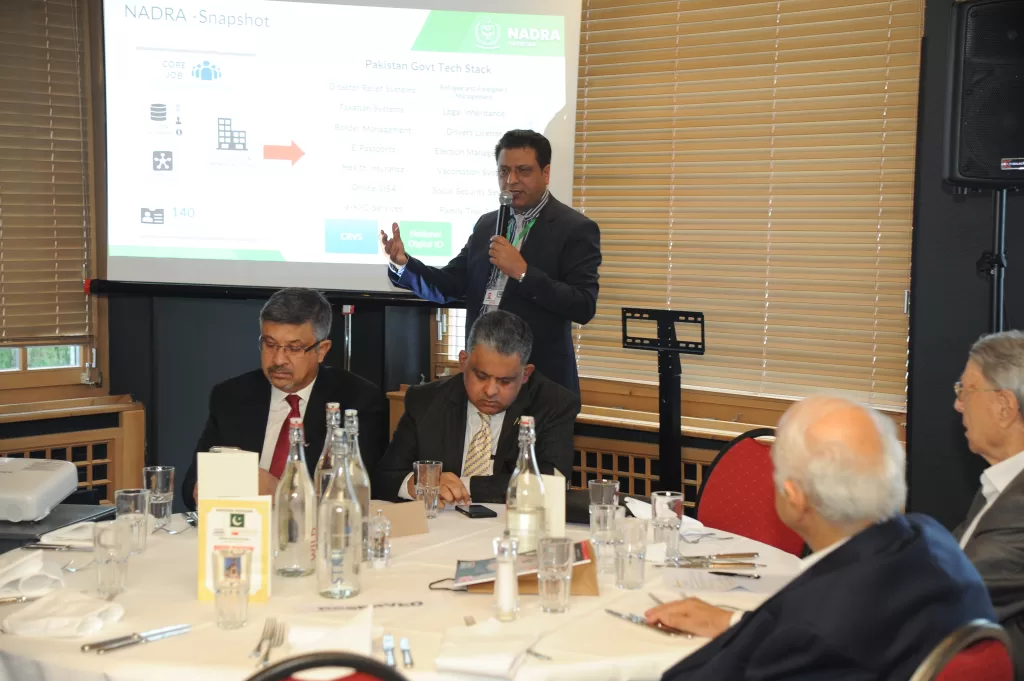
Salman Ali, Moderator
Thank you so much for your kind words. Now, I would like to invite Dr Tariq Malik consultant of the World Bank, and former Chairman of NADRA.
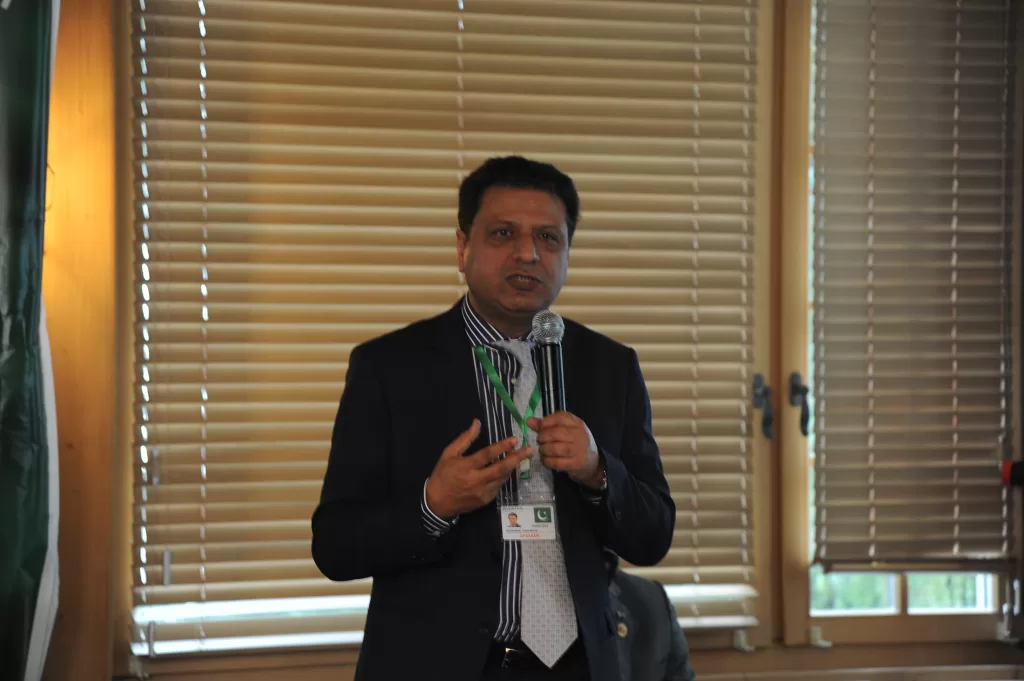
Dr Tariq Malik, Consultant World Bank
Thank you very much for providing me with this opportunity. I feel quite privileged to be addressing such an esteemed panel and audience, including your Excellencies. So, as we say in the UN, all protocols are observed, let me take you on a journey and connect some dots.
My preamble is the World Economic Forum (WEF) agenda. I have to connect the dots from the last time I was here after Covid-19. You know, I heard a lot about the term ‘poly-crisis’ or the mother of crises, or the crisis we were going through with the Covid wave. We had floods, earthquakes, and various other challenges globally. And it exposed governments around the world, not just in developing countries, but also in developed countries. We spent one year trying to figure out what the new agenda for the WEF should be, and we concluded that it was about building trust. And that’s where identity or people-centric applications come into play.
Why do I say it exposed governments around the world? Because they found out they hadn’t done the basic task of counting the people. When people thought that now we have to count, we should count on the state, but the state struggled to find out where the poor were and how to roll out targeted subsidies to them. But Pakistan was a country that handled all these crises because it had a foundational system. It had counted its people. That’s the story of Pakistan and that’s the story of NADRA.
So, I had two strings in NADRA. The first string was the challenge to move towards universal coverage; to count everybody and bring them on board. But once we completed the data, everybody had an ID card, what was the next stage? And the next stage was to use that instrument, the identity instrument to build trust.
An ID card is not just a piece of plastic or a chip or a document; it’s a social contract between citizen and state. So, the offshoots or the linkages that it creates, like social inclusion programs, social protection programs, and many schemes like the Asaan Mobile Account, actually strengthen the social contract. So, when I left NADRA, it was the first thing I explained in the same way to the United Nations. And then they said, okay, we have a goal. It’s called SDG 16; social justice. Target 9 of the Social Justice SDG 16 was agreed upon, and we calculated that there are 1.5 billion people who do not have any kind of legal identity. So, the term ‘legal identity’ was invented. Now, they are less than 1 billion.
And after that, when I left NADRA, they said, okay, now what’s new, Tariq? I said we have to roll out the digital public infrastructure to strengthen that social contract. We found out we had counted the people. Now, the next stage is to create these linkages to strengthen the social contract. And we are talking about Digital Pakistan.
I have just come back from a tour of Africa, and I was talking about SMART Zambia, digital Tanzania, digital Malawi, and Madagascar; a lot of countries are going the digital way. But my thesis is that the country comes first and digital comes afterwards. We always put digital first, but when we talk about the country, we always talk about the mountains, sceneries, and beauties of the country. But we forget that the real asset of that country is the people of the country. So, first, you have to count the people then you have to provide something for the people.
Let me take you on the journey of Pakistan and how we are addressing the digital part. I tell this to all the countries: there are two parts of digital, one is digitization, archiving old records; don’t discard them, and don’t start afresh. And the second part is digitalization; automating procedures.
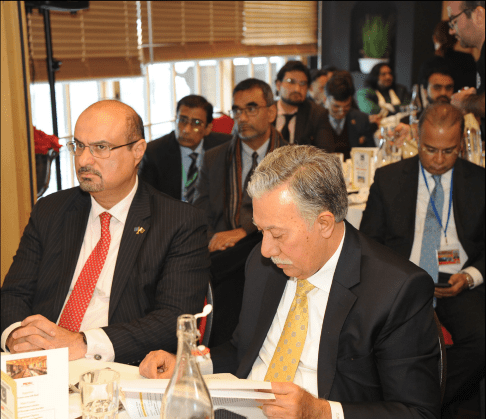
So, let’s see in Pakistan when we started. This was the model that I presented to the United Nations to first do digitization and digitalization of United Nations Agencies back in 2019. First, we had put the UN agencies’ agenda here on what governance means. What is the derived value you want to achieve from whatever digitization? And they said we want to enhance UN capacity for improved service delivery on humanitarian crisis and all that. We want the international social contract of the UN should be strengthened with its states. UNDP wanted to roll out targeted subsidies, and social protection. They wanted to combat corruption and financial crimes, effective disaster management, and evidence-based real data for public policy formulation, and the UN wanted to govern smartly and safely.
So, I had to make this digital governance process. So, now I go to different countries, and I say you have various Ministries and these threads of government are united through whatever constitution you have; we have the constitution of Pakistan. So, this creates the social contract; then you have all the digital technologies, you have connectivity, you have hardware and you have software. But use that not to set up a digital theatre for the maximization of the profit of the big companies whom you see down there; use it for people-centric solutions. You can create a value which is measurable in quantifiable terms just like the Asaan Mobile Account (AMA), we can say you have seen the screen 10 point to some million accounts, so a good governance process if it follows the journey.
In Pakistan, NADRA’s job was to create a citizen database. As you know, Chief Guest Jehanzeb Sahab has just mentioned that we started in 1971; no digital technology was there. But at that time, there was a vision that okay, we need to count the people because we wanted to strengthen the social contract. But after that, we used technology solutions and developed an infrastructure, which we call now Digital Public Infrastructure (DPI). We registered 190 million people out of 230 million people; this is an old figure, I left Nadra 7 months ago so it has touched now 190, and we created a government tech stock stack. We have a stack of identities, but how that database will strengthen the social contract?
So, Disaster Relief System, Floods of 2010, 2011, and 2014 also earthquakes. So, we handled it effectively and when we say Pakistan is here to stay, and it is staying, and it is still there, is because of the system that we reached out to those communities which were affected. The state was there and the rate of the state was strengthened we used it to find out the richest of the rich who didn’t pay the taxes of 3.5 million. So, we have reformed our taxation system, we have effectively managed our border, we have an e-passport, we have Sehat Sahulat Program, we have rolled out an online visa, and our e-KYC system is exemplary for a lot of underdeveloped countries. We have a refugee and foreigner management system, and we have rolled out a Succession Certificate application where property is automatically distributed based on the family tree.
So, two types of systems can create digital transformation and both have to work, one is the foundational system, which is Civil Registration, and Vital Statistics System, National Digital ID, and Census System, we have this time done digital census. So, our foundation is very strong based on that you can roll out digital public goods. So, this is the model that every country is striving for now, and they need NADRA-like authorities and I have created it in five different regions.
There are more than 100 projects that we have done, National and International projects that NADRA is doing, some South-South cooperation also, we have national projects you can read out and you can log in and see them on the NADRA website.
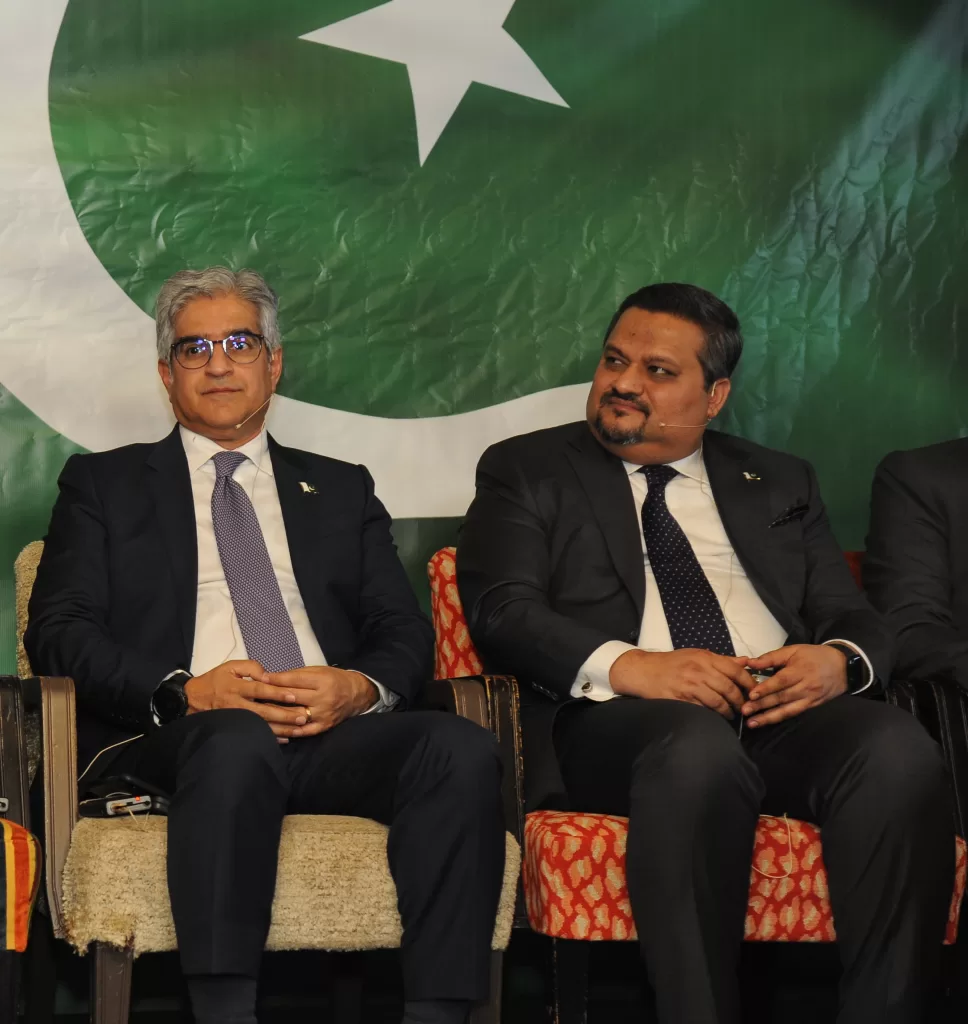
Here, I want to make a case for why NADRA should be supported and the funds should be given to that organization. The answer is that we can speed up the digital transformation drive of the whole world. How we have helped Kenya to come up with the machine-readable passport, Somalia National Identification System, Sudan Civil Registration System, Nigeria Identity Management System, and Fiji Elections Management System. There are 30 some 34 European countries, who are using our Readmission Case Management System. A couple of projects which are the signature projects that we have done in the last two years, I have done 45 projects, which means these are the projects that touch every person’s life in Pakistan, like computerization of electoral roles underpinning one person, one identity, one word like digital census and so on.
At the start, I mentioned how that model is working, we are connecting it with SDGs. So, we connected those projects with SDGs, then we are now in a position where we can say that 3.5 million tax evaders have been brought into the tax net. We can say that we have 9.3 million BISP beneficiaries, 30 million people were affected by floods and they were given that much assistance.
So, this governance model has exact numbers and the interventions documented and connected with the global agenda of global goals like the SDGs. We talked about health education and financial inclusion, which were well covered by Aamir Ibrahim.
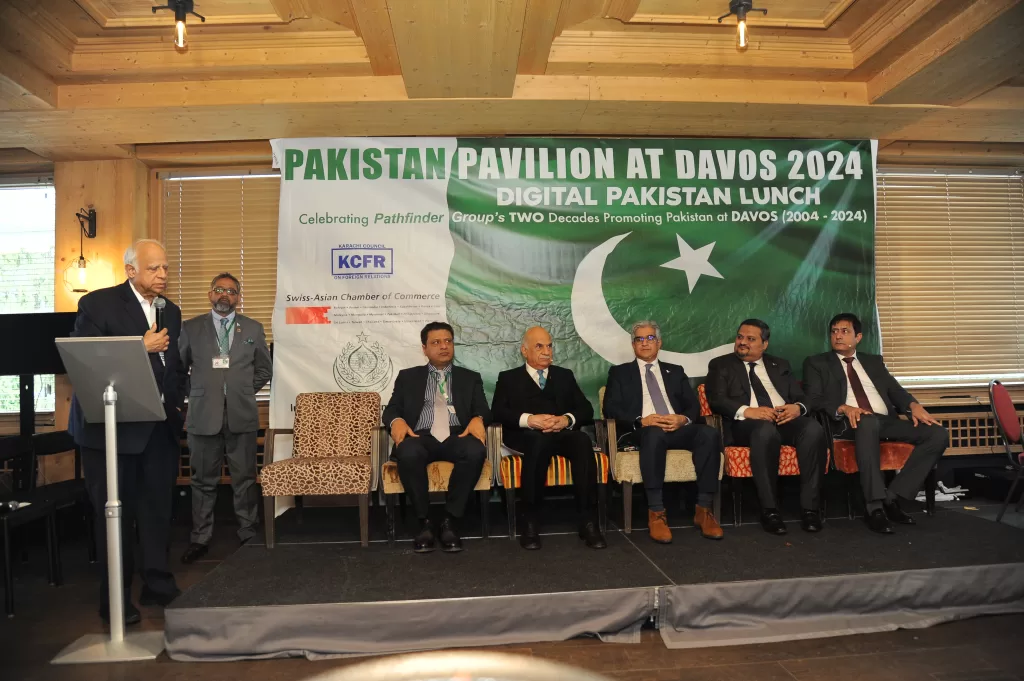
We were now going towards digital ID from the physical ID. Pakistan became the first country who invent contactless biometric verification, this is the application called Pak ID. You can log in now on Google or iTunes and download it, you used to go to the NADRA office or any office because you had to give your fingerprints physically. Now, we integrated it with the smartphone you have a camera and you take your fingerprints, take your picture, and upload your document, we built the AI into it. You cannot upload any document the AI software checks whether it’s a birth certificate, whether it’s a marriage certificate, and it says no you are uploading the wrong document. So, more than 1 million people have used this application and they have registered themselves. Technology has made onboarding easier. So, the insurance companies, the banks, and the credit card companies have now started using this application, all of these land records, utility companies, and utility corporations, will tell you how this has helped them.
We have another initiative Roshan Digital Account and look at that five billion dollars were remitted to Pakistan, by connecting just the e-KYC with their physical bank accounts. So, now we provide Bio-services, a Verification System and XML and the basic textual KYC of Asaan Mobile Account. We learned from the Assan Mobile phone account that we have to do KYC in multiple ways not only through the web. I can’t leave without talking to the AMA 10 million accounts have opened and it has a centralized wallet management system and withdrawal through wallet, we talked in the morning about what were the challenges. The key challenge was how to digitize the KYC part, there are lots of projects that we have done which you can see on the NADRA’s website which has made the life of a common citizen easier and this experience has been now transported and replicated to various countries. So, this is a success story of Pakistan, thank you very much.
Salman Ali, Moderator
Thank you so much for your kind words. Now, I invite today’s keynote speaker Muhammad Zohaib Khan.
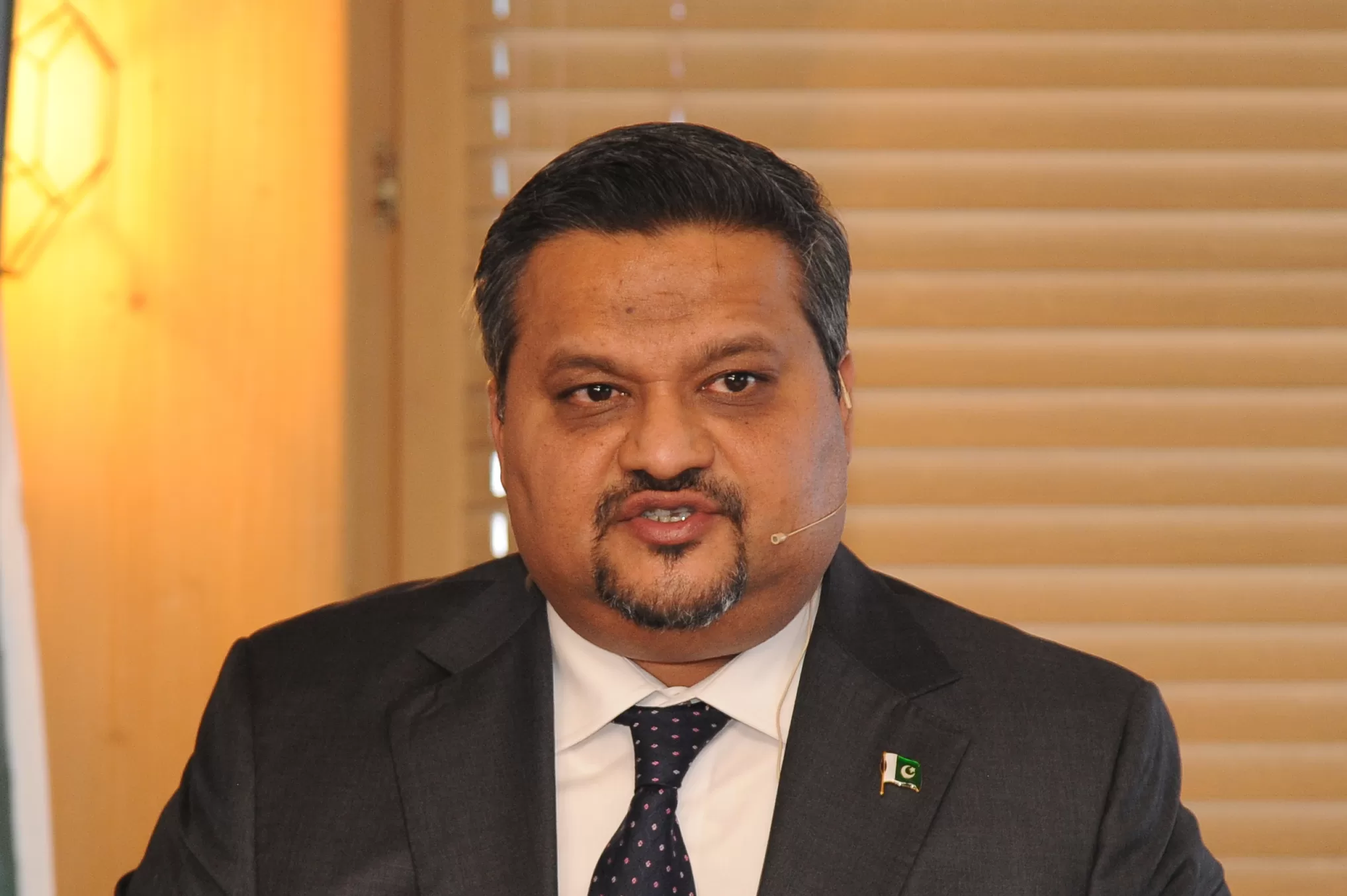
Muhammad Zohaib Khan, Chairman PASHA
I just want to start with what PASHA is, what the landscape of the Information Technology sector in Pakistan looks like, and what’s the current status? So, Pasha is the only National Software IT Association, registered under the Ministry of Commerce, with the policy and vision of representing the vocal demands of the IT sector of Pakistan. Our core objectives are: we have three or four pillars right now, including brand outreach, that is Tech Destination Pakistan. We have been focusing on this for the past few years, and especially this year, engaged in multiple countries and having this opportunity to be in Davos for policy engagement.
Dr Jehanzeb already mentioned how amazing this is for the IT sector of Pakistan since the formation of the Special Investment Facilitation Council (SIFC) and the state has taken responsibility for the continuity and execution of the policy, witnessing amazing growth for the past four to five months, with Alhamdulillah witnessing a 17% growth in IT exports of Pakistan this month.
Third, the main topic I want to address is the skill set, which is the goldmine of Pakistan, the youth population of more than 60-65%. In Pakistan, there are multiple export-oriented sectors, but IT is the only sector which is a trade surplus, and our raw material is our people, the youth of Pakistan. We are investing in human resources. Pakistan, being the third largest English-speaking country, is an ideal location for the Global IT Tech Hub. Currently, we have over 50,000 IT graduates graduating from Pakistan. Pasha and our collaboration with the Ministry of IT’s role is to conduct boot camps that focus on skill sets required by the international market such as artificial intelligence, cybersecurity, data sciences, and machine learning (ML).
In the last 5 years, we have witnessed more than 178% growth in our IT exports, which is also being witnessed in the region, and Pakistan is having a great opportunity and booming in the technology sector. Pakistani companies are already evolving in areas such as cloud computing, e-commerce, robotics, big data, and AI. There is an investment opportunity to train our people, set up regional back offices, and resource augmentation. I just want to share some of the success stories that currently, Pakistani companies are providing services to companies like BMW, GE, Nestle, Google, and so on, covering more than 120 countries from Pakistan.
Global Venture Capital (VC) are investing in Pakistan, including VISA, First Round, Buckley, GFC, and others. In the last couple of months, many success stories have emerged, with large VCs investing in Pakistan in many verticals such as fintech, blockchain, and many other startups and IT companies. As I mentioned, Pakistan’s IT industry is ready and fully capable of enabling high-tech needs in the world.
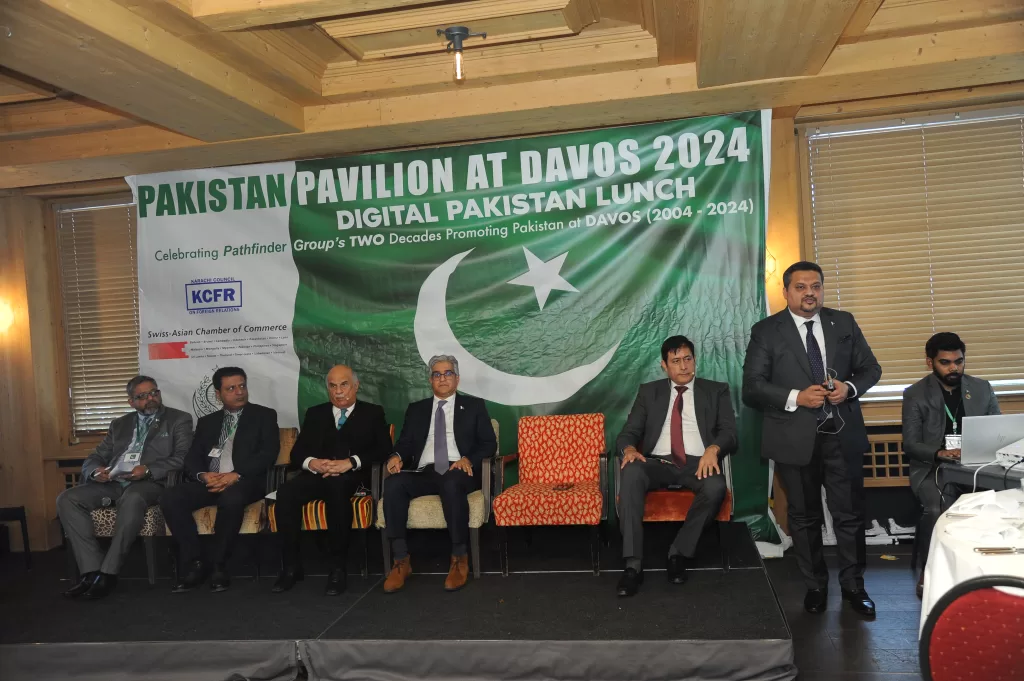
I want to highlight a success story where Pakistani companies have already delivered the National Payment Gateway of the Middle East, covered 80% market share, as well as provided technology in the African Stock Exchange Market. These are areas of investment, especially in product development, where Pakistan can be the strategic location for tech-side skill sets.
If you or your group have any opportunity in any vertical, we at PASHA, along with the Ministry of IT and other stakeholders, can provide these resources for skill sets and investment. As I mentioned, we are partners with organizations related to IT, the SIFC, the Ministry of IT and Telecom, Private Investment Club Pakistan (PICP), the MOFA, and so on. I would like to invite you all to visit Pakistan. We are planning for the biggest IT show in Pakistan, tentative dates are April or August 2024. Pasha and our organization group would love to host you there. Thank you very much.
Salman Ali, Moderator
Ladies and gentlemen let me ask Mr Amir Ibrahim to say a few words.
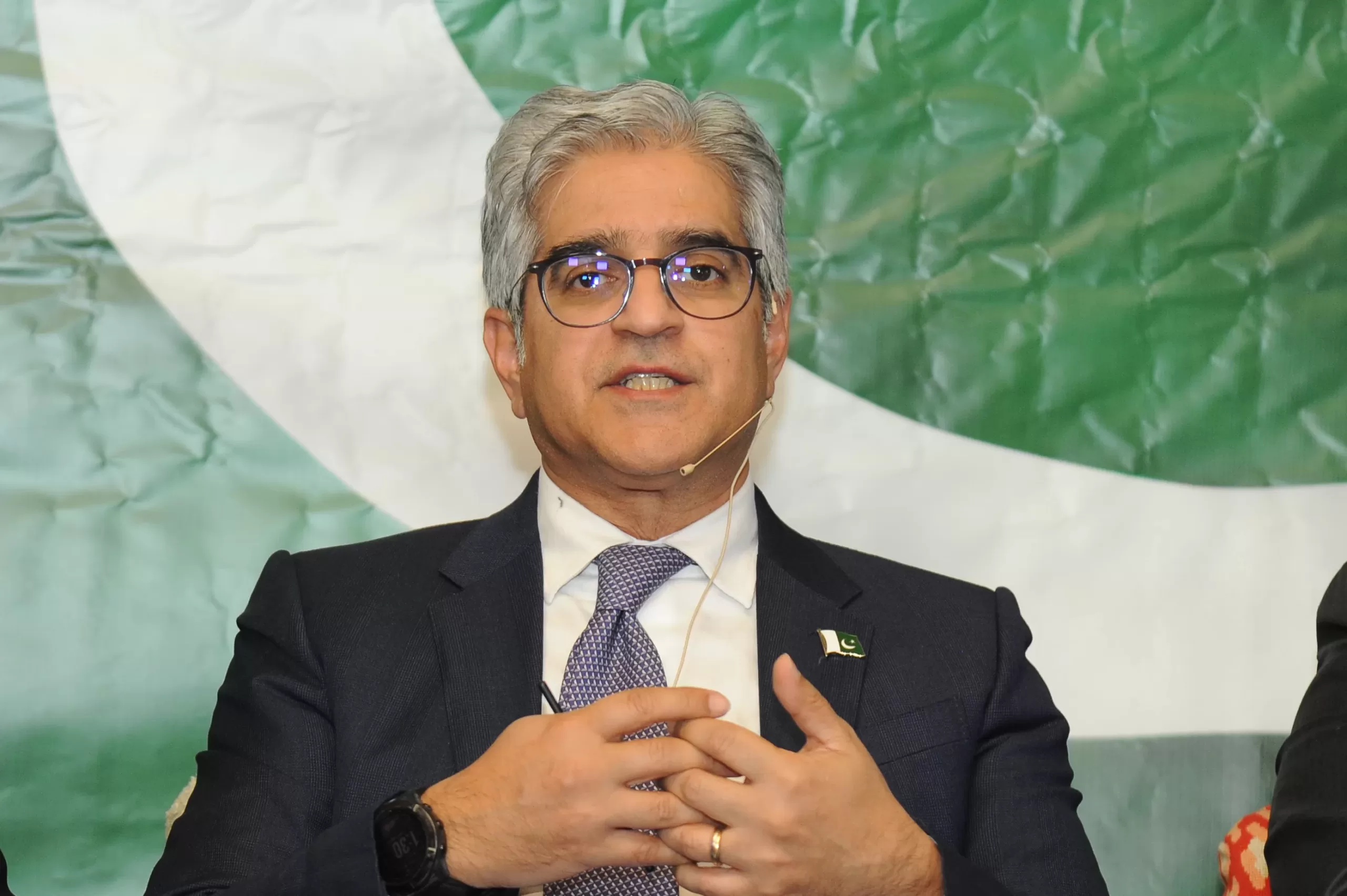
Amir Ibrahim, CEO JAZZ
For a while, I was a little bit upset that the SDGs did not have a goal that there should be broadband for everybody. But it was encouraging to hear from Tariq about SDG 16; social justice. I think it is enabled by telecommunications providing robust infrastructure, which is imperative. They will help with gender, poverty alleviation, and every single thing that we want to achieve as the world overall. So, it is really important to recognize that telecom is no longer just a sector but a cross-sector enabler.
Why do I say that? Because we’re sitting here right next to the government, the need for a better understanding of the capabilities of this sector is extremely important. Gone are the days when we would only look at it as a value capture. By all means, government and telecom is, of course, an extremely regulated environment. Every country has the right to tax its people, its industries, and its successes, but I think we now need to get into a different kind of dialogue. We must talk about how the country benefits in the longer term rather than capturing things in the short term.
So, what we should do? we should tax success, not tax hope. The models of auctions, unfortunately, haven’t succeeded in Pakistan, and there is now growing awareness and criticism of those around the world. Also, companies have spent billions of dollars in Spectrum acquisition but have failed to equip or roll out the network that was needed. Consequently, even in the case of Pakistan, we have more than about 15% of our population which is not covered by any kind of signal. So, we owe something, firstly, to those 40-odd million people of Pakistan where there is no kind of a signal.
Before we start talking about 5G and 6G, I will spend a little bit more time on 4G. What the customer needs is the internet; these things are sold predominantly by technology companies whether it’s four, five, or six. Customers are not interested in features; they’re interested in benefits. And as I highlighted, the first benefit they want is internet which works, affordable internet, internet which is fast. We as a country need to ensure that our policies and the responsibilities that I have as the Chief Executive of the largest internet services provider in Pakistan, I want to make sure that no citizen is left behind. We will invest in innovation, and we will look at the best practices from around the world.
But we don’t want to be guilty of elite capture, where we provide a technology which is relevant only for 1% of the population and we ignore the 50% of the population which still does not have a smartphone. So, there’s a need for a lot of work over there. As they keep on saying, there is no cyber without fiber. We need to ensure that every household in Pakistan is equipped with broadband so that we can put a smartphone in every hand, and we work with policies that ensure smartphone availability.
It’s very encouraging to see that in the last few years, there are about 27 companies in Pakistan that are now assembling phones in Pakistan, and it’s only a matter of time before the deletion kicks in and we can provide the same kind of opportunities in smartphone manufacturing as we have in other industries.
I also want to shift gears in terms of how we help the government. As I said, we would like to see ourselves as an extension of an ecosystem. We have a great ability to provide data, and NADRA has a huge database. Jazz, as a leading operator with 70 million customers, captures close to 200 billion data points a day. Through our 70 million customers, we know their locations, we know their spending habits, and we know their calling patterns. We need to make sure that we can use this data to enhance the tax base.
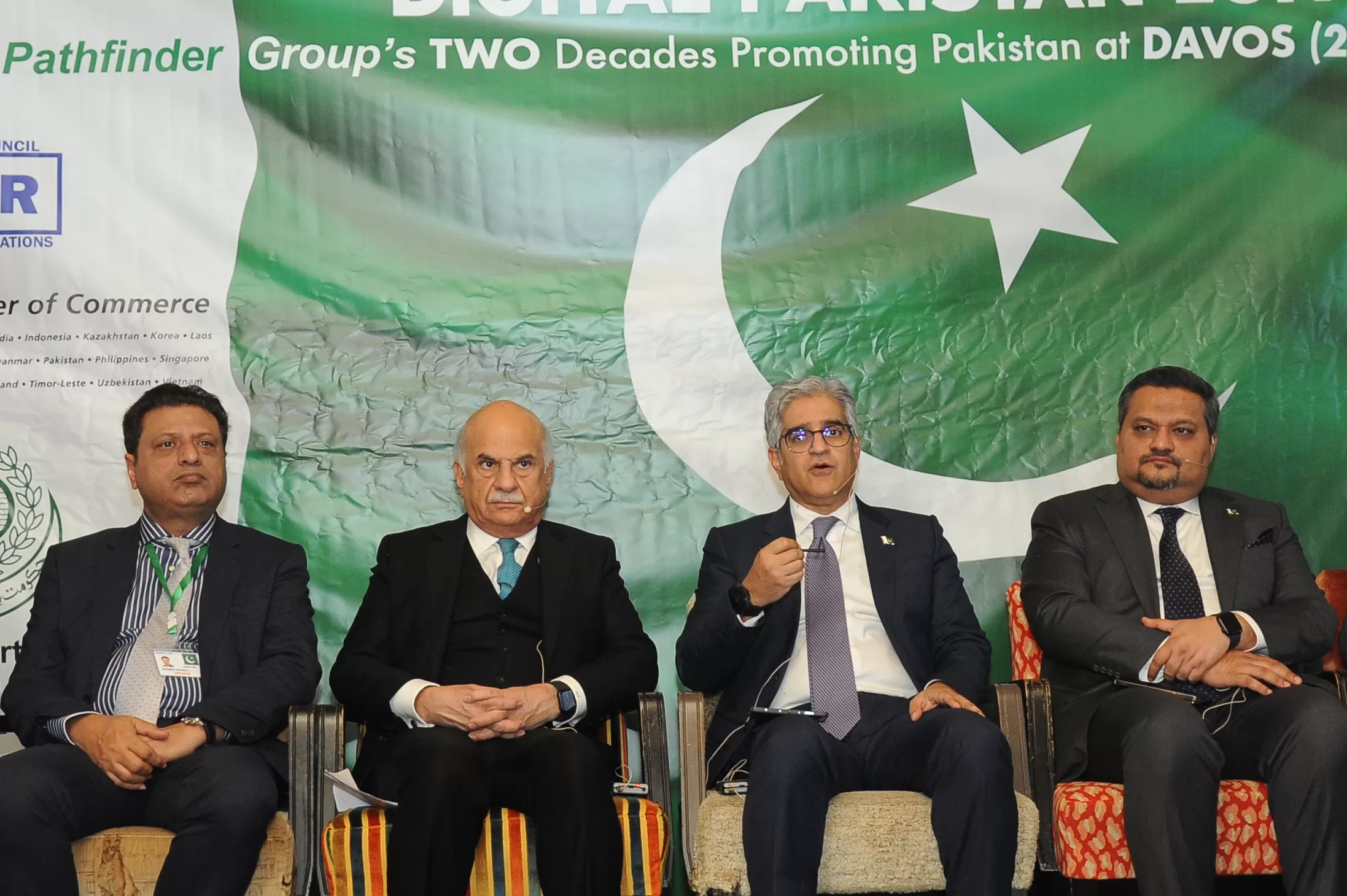
Already Jazz, through its subsidiary JazzCash has 300,000 retail points. This is a great opportunity for us to bring those retailers into the tax net. And that’s where, again, I keep on going back to how we digitize the nation. It starts with a dialogue; it starts with having a really honest conversation. And once we get past this mindset that the government is here to do only governmental value capture and the government feels skeptical that the private sector is only here to maximize profits, unless we go past that mindset, which is a win-lose situation, we will not be able to cash in on the benefits of digital Pakistan.
We are an enabler for a smarter nation, we’re an enabler to make sure that there’s a smartphone in every hand and broadband in every connection. I’d like to now pivot more towards financial services inclusion. I think the next big opportunity in Pakistan is making sure that we can equip retailers and individuals with access to banking. We want to make sure that it’s not just for consumers but also for one of the biggest ignored segments, which is the Small and Medium Enterprises (SMEs). They just do not have any access to formal funds. We have a responsibility to make sure that a small company can grow into a medium-sized one, and a medium-sized one into a larger one. Now, there are very few opportunities where a shopkeeper can get a loan of even $2,000 and open another shop. JazzCash and Mobilink Bank are providing those loans. And while we are excited about corporate banking and high-level consumer banking and then going down BNPL (buy now pay later), I think we keep on missing the middle class, and that’s where the small-medium enterprises are.
So, we owe ourselves and our countrymen and women the right to have access to cheap affordable funds, and that’s an area of huge opportunity for us. I’d like to conclude that there are opportunities but after 75 years, I think it’s time that we stop talking about the mountains, we stop talking about the geography, we stop talking about the history. We have to be focused on looking at the future, we are making progress. There was a question asked this morning, is State Bank a facilitator or are the roadblocks, are we making progress? We are making progress, everybody’s very intentional about making progress but are we where we need to be? We’re certainly better than where we were two years ago, but we are not where we need to be, and a mind shift is required.
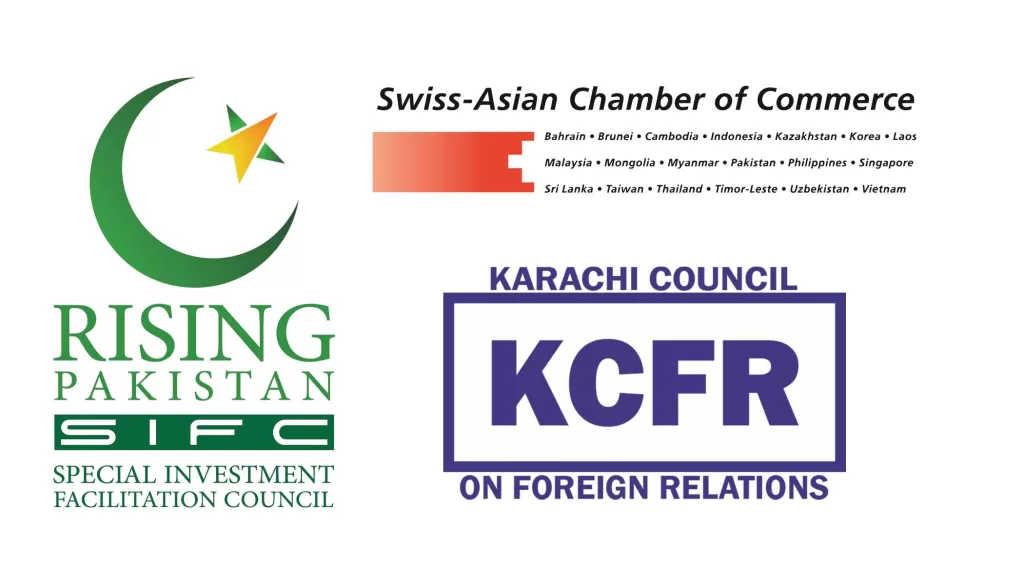
And I hope that colleagues, people that we’re interacting with, they’re here at Davos spending their time, their energies, and their resources to showcase Pakistan. Not to convince one another but to also have meaningful discussions and dialogues on how we move the needle. So, I look forward to greater participation for the rest of the day, today with people like Jehanzeb Sahab to make sure that our perspectives consider us as sincere advocates. And us being a longtime investor in Pakistan, having invested more than 10 billion in the country, we would be your biggest visiting card when it comes to SIFC, when we have to attract more people in, they’re going to talk about how have the previous investors been rewarded. Our success story is going to be one of the biggest visiting cards for future investors to come and invest in Pakistan. Thank you.
Salman Ali, Moderator
Thank you, Amir, for the kind words and looking forward to all the things which you have mentioned and hopefully, I just want to say that the mindset needs to be changed. Yes, but financial literacy can play a very important role and I must say that the State Bank should consider this financial literacy part, because as per my knowledge right now this part is missing. So, we go and tell the State Bank to do something about it. A very important person, I’d like to call upon for a speech who changed the whole Utility Stores Corporation (USC) from analogue to digital; Mr Shakeel Ahmed.
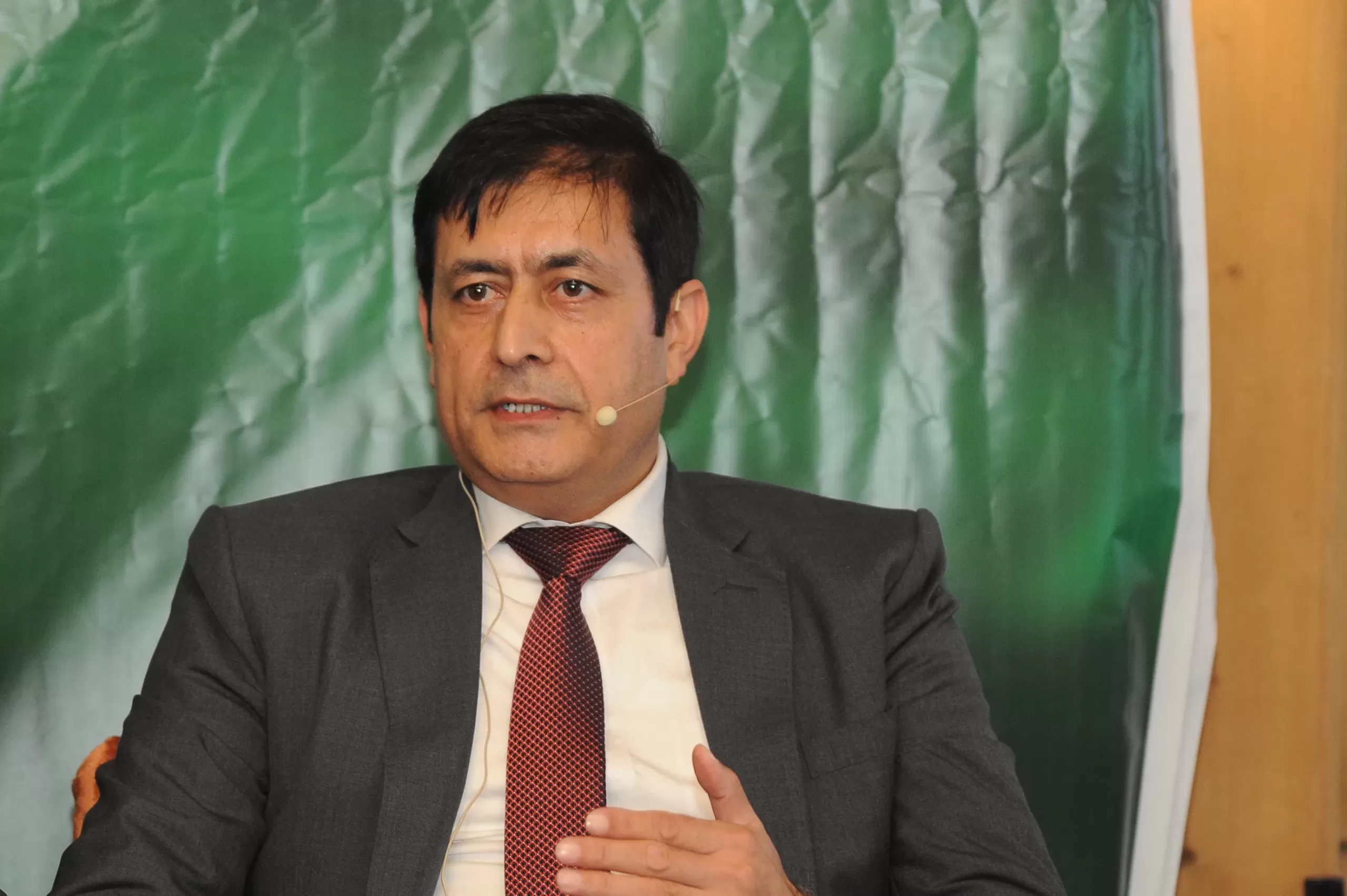
Shakeel Ahmed, GM IT Utility Stores Corporation
Let me share an interesting story of a state-owned enterprise and how digital transformation has transformed it from losses to profit. This is the story of USC, established 53 years ago with only 15 outlets across the country. Its objective was to provide economic relief to the citizens of Pakistan by selling essential commodities at prices lower than those prevailing in the open market and to act as a price moderator in the market.
Over time, USC expanded to operate more than 4,000 stores across the country, making it the largest retail chain of grocery stores in Pakistan. However, until 2021, all its business processes and operations were handled manually, leading the organization to face significant challenges and eventual failure.
Recognizing the need for digital transformation as the only way to survival, a major project was initiated to automate all business processes and retail operations. Despite challenges such as the lack of IT infrastructure, the absence of point-of-sale equipment in stores, connectivity issues, and resistance to change, the project moved forward.
Today, USC stands as the only organization in Pakistan where all business processes and operations are performed digitally on a digital platform. This digital transformation has been instrumental in turning the organization into a profit-making entity.
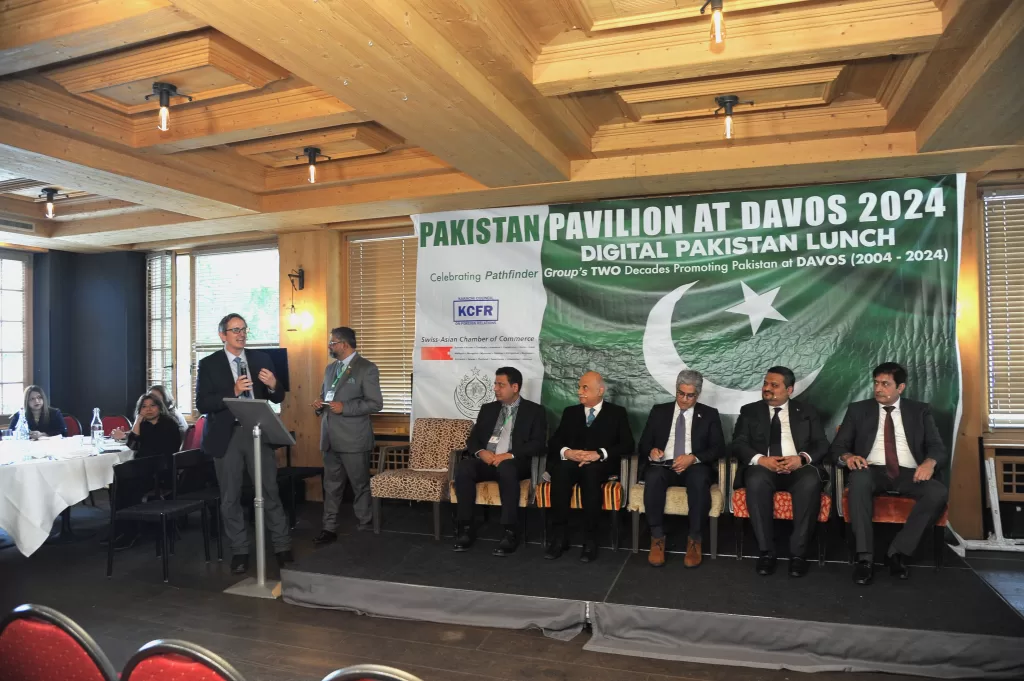
With every store and warehouse connected to a central Enterprise Resource Planning (ERP) system, inventory information is readily available, enabling the company to make informed decisions and ensure the right products are available at the right time. Moreover, suppliers are connected to the system, allowing them to manage their supply chain effectively and ensuring timely delivery of products. The organization is also linked with NADRA and BISP to provide subsidies to targeted individuals, with transactions verified in real time.
Moving forward, Utility Stores Corporation is working on various initiatives, including enabling digital payments at point-of-sale systems, integrating with the Virtual Remittance Gateway (VRG) platform, and launching e-commerce services. These initiatives aim to enhance convenience for customers, facilitate cashless transactions, and expand the reach of USC in serving the people of Pakistan.
Salman Ali, Moderator
Thank you very much. This is a real story of an organization especially a government organization which transformed their whole operations end to end digitally. I would like to call Mr Ali Shah Asani to say a few words and some new products as a health-tech product, which he’d like to introduce.
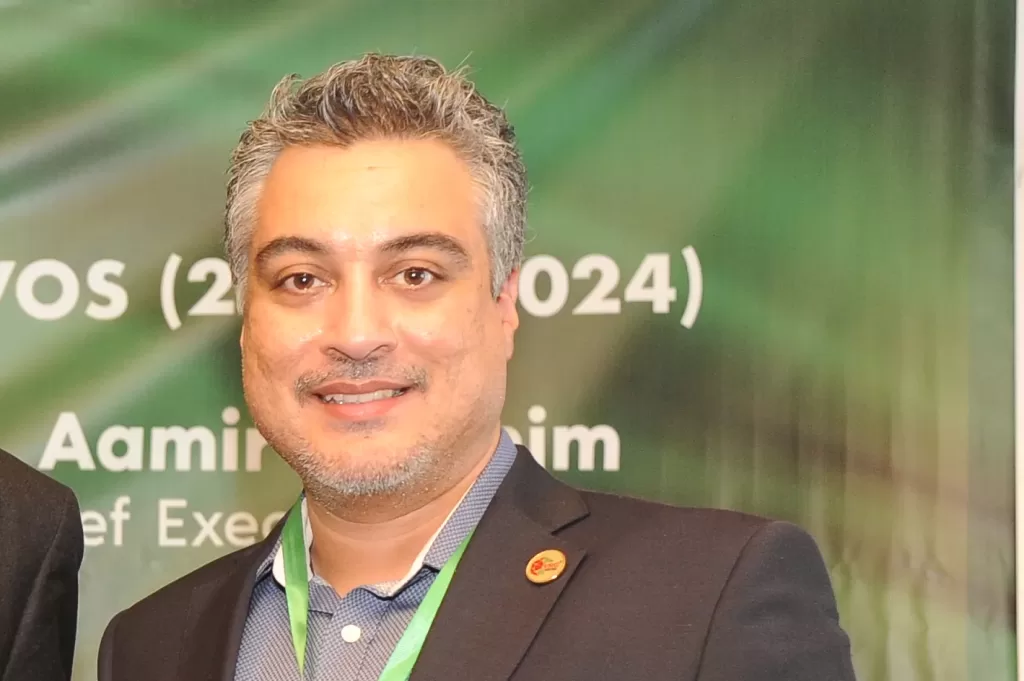
Ali Shah Asani, CEO IPath
A lot has been discussed over the past two days about Asaan Mobile Account, and health tech is another vertical that we focus on. Before diving into the specifics, I’d like to touch on the emerging trends in technology at Davos over the years. In 2018, the focus was on cryptocurrency, followed by blockchain and cryptocurrency again in 2019. In 2020, machine learning and AI took centre stage, while 2021 was all about NFC. Interestingly, in 2022, the spotlight is on generative AI.
While these emerging technologies garner attention, it’s crucial to find real-world use cases for them. This doesn’t always mean adopting cutting-edge technology with all the bells and whistles; rather, it could involve something simple yet essential. This brings me to the concept of “My Mediport,” a platform we’ve developed as the first step towards building Pakistan’s National Electronic Health Record Platform.
The idea behind ‘My Mediport’ is straightforward: every Pakistani with a CNIC should be able to walk into any hospital, provide their CNIC to any doctor, and have all their medical records retrieved instantly. This concept is not new globally, with countries like Australia, Switzerland, the European Union, Turkiye, and the UAE already implementing similar platforms.
Now, let’s address the challenges in data interoperability, which are prevalent not only in Pakistan but also in markets like North America. For instance, 80% of malpractice cases occur due to the lack of data availability during care transactions. Additionally, only three out of ten individuals have access to their lab results, leading to unnecessary reordering of lab tests. To tackle these issues, My Mediport offers an integrated healthcare information system with augmented intelligence, ensuring HIPAA compliance in the US and Hi-Trust compliance.
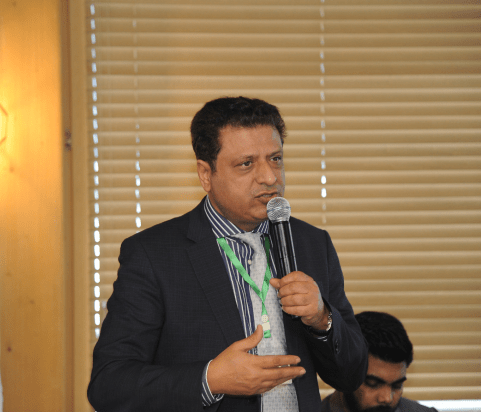
By centralizing health records and providing access to both patients and providers, My Mediport streamlines healthcare delivery and improves patient outcomes. However, implementing such a platform in Pakistan poses bureaucratic challenges due to data ownership issues. Despite these hurdles, a national electronic health record platform holds immense potential for advancing research, clinical trials, and public health initiatives.
We’re actively seeking partners in Pakistan to implement My Mediport, either as a white-label solution within existing healthcare networks or through collaborative efforts to establish a national platform. By harnessing the power of data interoperability, we can revolutionize healthcare delivery in Pakistan and contribute to better health outcomes for all citizens.
Salman Ali, Moderator
Thank you, Ali. So, in the end, I would like to call up the Co-Chairman of the Pathfinder Group for a vote of thanks.
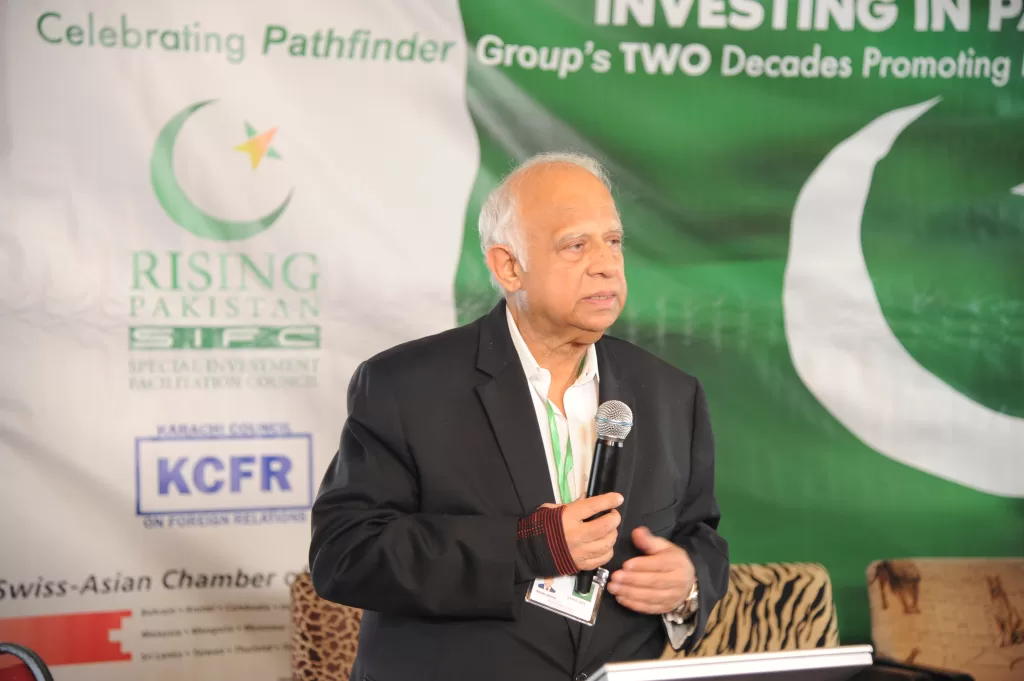
Ikram Sehgal, Co-Chairman Pathfinder Group
First of all, thank you, Salman. I must say that we heard a very extensive subject-wise absolute knowledge about the digital landscape in Pakistan and in different categories. I’m thankful to each one of you, starting with Dr Jehanzeb, the Planning Commission, and of course SIFC. The only thing that I would request you is that please do not keep the SIFC only for foreign investment; a lot of people have invested a lot of money domestically and they faced the same bureaucratic problems. I’m not a resident of Dubai, so I can’t do that. So, we must take investment as a whole, right?
Coming to Dr Tariq Malik, I’m very grateful you have come all the way, in my mind there’s no doubt about what you have done for Pakistan. You changed the total thing set without an identity program. I don’t know where we would be without it, it is a great accomplishment.
Now, I would like to talk about Zohaib, you’ve done a lot for the industry. I take your point that maybe some support can be given right to us. Shakeel Sahab, of course, there’s no doubt that you’ve changed the Utility Stores Corporation; it was a black hole where you could throw money down. Now, that we know actually what’s happening and in the context of what we are doing with Dr. Amjad Saqib with Jazz, etc., it becomes very important for us, and I would certainly like to explore this further. We’ve already integrated with you to explore this further because, at the end of the day, you want to get the BISP program money is supposed to put food on the table, and first of all, the money has to reach the right person, and that person then has to spend that money on food, not on her husband’s drugs and drinks or the son’s things, etc. So, that is part of the process we will undertake.
I’m very grateful for the presence of both ambassadors here. I do not have any doubt in mind that Ambassador Rizwan Sheikh is an excellent advisor, and he always reminds me that I am a diplomat. His advice has helped, guide us on where to go and what to do. We are fortunate to have him not only in an area where investments can come but also as a representative of MOFA in SIFC.
And of course, I must thank Ambassador Hamid Shauqat because the moment I reached out to him, his response was immediate within minutes. I started getting the responses to the requests I made, and it showed exactly because I have never really dealt with the Pakistan Embassy in Bern too much, but mostly, leading all through these 30 years of the Pakistan Embassy in Geneva, United Nations. And of course, one after the other, the ambassadors were fantastic and the people were fantastic without any hitch, the responses were very good.
Having said that, we now come to the end of the Pathfinder Group’s Association here for this Davos. I must thank my family; my son is inside the Congress Center, Shehnaz and Haya and Nefer (my daughters) and my sisters-in-law are here. I must thank them for the support they’ve given, and I must thank my staff. There are no words to describe them; they were just fantastic. They worked, I think they just took the leash off and went at it.
I’m sorry I’m trying to rush things in because Toni Morosani, who’s the owner of this hotel has requested that he needs this hall very soon. But I have some good news, and I’m going to discuss this with Amir and Zohaib, and with the SIFC. Toni Morosani has given us the basement for snacks and a nightcap on Wednesday and Thursday next year so that we can have qawwali singers’ performances there, including these two halls. So, we have to keep the Pakistan Pavilion, of course with partners as we can’t do it all by ourselves. But we’ll continue to have the event in future.
I want to acknowledge my friend Paul Borchi. Paul is 85; he’s the owner of Panorama. I was the first member who went there and has stayed there for the last 30 years, coinciding with the World Economic Forum events. The transition of Panorama’s ownership, which concluded about a year ago, marked a significant change. However, Paul ensured that the essence of Panorama’s hospitality remained unchanged. He explicitly instructed the new proprietors to extend the same courtesy and respect to Mr. Sehgal and Pathfinder as he always had. Paul, thank you. I take great pride in the fact that you drove so much, so far away just to be here for this lunch. It’s very good of you, and I tell you that we’ve already enjoyed Panorama, and if I moved out a little bit to Morosani, it’s because you have left Panorama. And so, we come to the end of it all.
I will end by saying again to Amir and Jazz, very good of you to trust us. You trusted us; you know better how things are and we can do this much better, and I think we’ve got some other partners we can discuss this with, how we can improve, how to make it more meaningful because at the end of the day our job is to promote Pakistan. It doesn’t matter which political party is in power; whoever represents Pakistan should be promoted.


